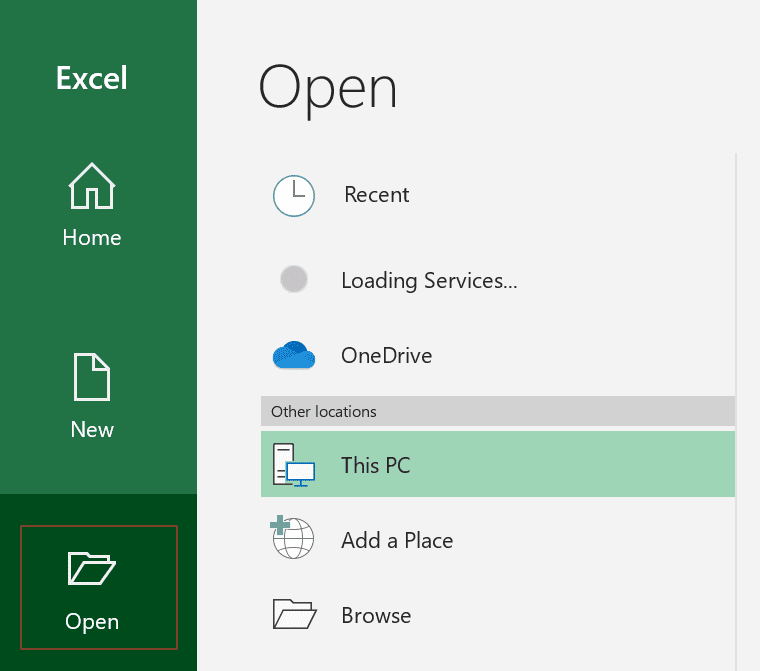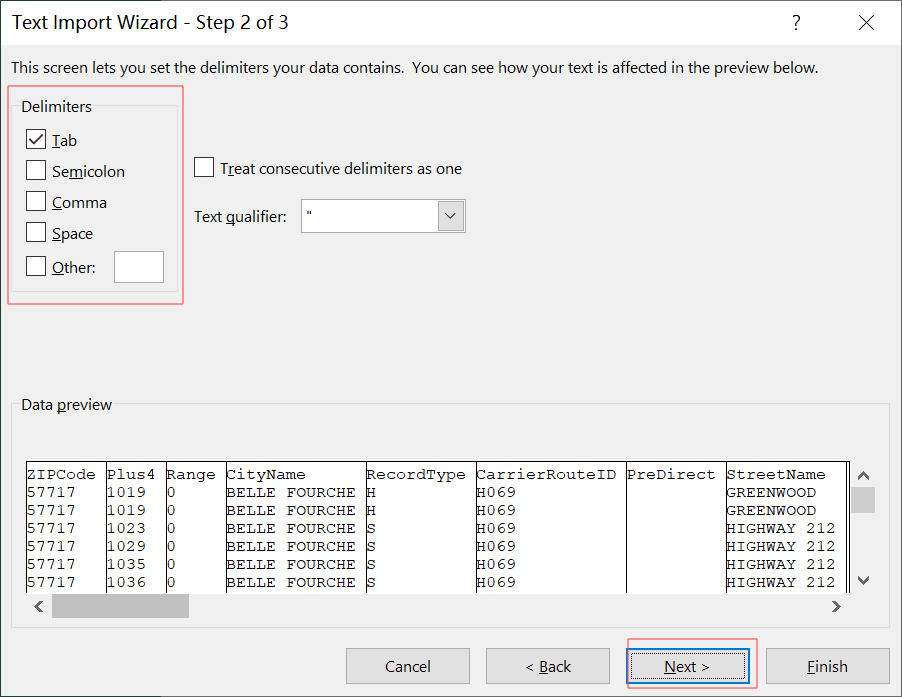US 5+4 zip code data has been updated!
At the beginning of November 2019, we updated the 5-digit plus 4 zip code data in the United States, and the average amount of data in each state has changed. Purchase address: US 5 + 4 zip codeAt present, our zip data sales station provides two sets of data for the US zip code. One set is a 5-digit plus 4 detailed zip code with subdivided addresses. The other set is a 5-digit zip code in the United States.
The 5-digit zip code can look up the city, and the 5-digit plus 4 zip code can look up the specific building number.
Our data is stored in txt text, when you purchase the data, you can open it by the editor, EXCEL, or other program. There are some tips for opening it by EXCEL:
First: if you have the data, you may save it to your own folder, and unzip it.
Second: open your EXCEL, and open it.

Then: select the extracted file-open-next-next (the separator selects the tab key), and click next.

Last: View the data preview. If the data column starts with a number, choose the text in the column data format, and avoid the data starting with 0 to lose 0. Clicking finish, you get it.

Below is the field name and explanation:
ZIPCode:ZIP stands for Zoning Improvement Plan. It is used to signify a delivery route in the United States as designated by the USPS. In most cases a ZIP Code is a geographic region with a center point.
Plus4:4-digits that are used to identify a geographic segment within the 5-digit delivery area, such as a city block or a group of apartments or an individual high-volume receiver of mail, or any other unit that could use an extra identifier to aid in efficient mail sorting and delivery. This code is the low end of the range of +4 Codes that pertain to this ZIP Code.
Range:The range of +4 codes. Summing the +4 Code and the +4 Range will give you the high end of the range of +4 Codes that pertain to this ZIP Code.
CityName:The name of the city (and in some cases, organization) designated by that ZIP Code or postal code.
RecordType:An alphabetic value that identifies the type of data in the record.
CarrierRouteID:A 4-digit code assigned to a mail delivery or collection route within a 5-digit ZIP Code. The first character of this identification is alphabetical, and the last three are numeric:Bnnn = PO box, Hnnn = Highway contract, Rnnn = Rural route, Cnnn = City delivery, Gnnn = General delivery.
StreetPredirectional:A geographic direction that precedes the street name.
StreetName:The official name of a street as assigned by a local governing authority. The Street Name column contains only the street name and does not include directionals or suffixes. This element may also contain literals, such as PO BOX, GENERAL DELIVERY, USS, PSC, or UNIT
StreetSuffix:The street suffix.
StreetPostdirectional:A geographic direction that precedes the street name.
AddressPrimaryLowNumber:A house, rural route, highway contract box, or post office box number; the numeric or alphanumeric component of an address preceding the street name; the low-end address in a range of addresses. Often referred to as house number.
AddressPrimaryHighNumber:A house, rural route, highway contract box, or post office box number; the numeric or alphanumeric component of an address preceding the street name; the high-end address in a range of addresses. Often referred to as house number.
AddressPrimaryOddEvenCode:Code that identifies the side or sides of a street for which a given address range is applicable. For street, highrise, firm and multi-carrier records, B = Both sides of a street, E = Even side of a street (even-numbered addresses in the range); O = Odd side of a street (odd-numbered addresses in the range). For general delivery, post office box, and rural route/highway contract records, this code will always be B (both).
BuildingOrFirmName:The name of a company, building, apartment complex, shopping center, or other distinguishing secondary address information. This column is normally used with firm and highrise records but may also contain literals such as Postmaster or United States Postal Service.
AddressSecondaryAbbreviation:A descriptive code used to identify the type of address secondary range information in the Address Secondary Range column. This code may be useful in address matching, i.e., the secondary address numbers may indicate apartment, suite, or trailer numbers, etc.
AddressSecondaryLowNumber:Code that describes an apartment, room, suite, space, floor or other secondary addressing numeric or alphanumeric that follows a street address. The low-end secondary address component in a range of secondary addresses.
AddressSecondaryHighNumber:Code that describes an apartment, room, suite, space, floor, or other secondary addressing numeric or alphanumeric that follows a street address. The high-end secondary address component in a range of secondary addresses.
AddressSecondaryOddEvenCode:Code that identifies a secondary address within a range of secondary addresses as being odd (0), even (E), or both (B).
ZIPAdd-OnLowSector:The ZIP Add-On High Sector and the ZIP Add-On High Segment together form the ZIP Add-On High Number, which is the high-end ZIP add-on in a range of codes; the add-on of the last ZIP+4 code in a consecutive series of ZIP+4 codes assigned to the delivery address. Most delivery addresses are assigned a single ZIP+4 code; however, large companies may be given a range of ZIP+4 codes that can be used to route mail to specific departments. A range of ZIP+4 codes can also be assigned to a corresponding range of post office boxes, and each box is mapped, one-to-one, with a ZIP+4 code in the range. A single post office box can also be assigned a range of ZIP+4 codes. (See also ZIP Add-On Code.)
ZIPAdd-OnLowSegment:The ZIP Add-On Low Sector and the ZIP Add-On Low Segment together form the ZIP Add-On Low Number. The ZIP Add-On Low Number is the last four positions of a ZIP+4 code; the low-end ZIP add-on in a range of codes; the add-on of the first ZIP+4 code in a consecutive series of ZIP+4 codes assigned to the delivery address. For example, most delivery addresses are assigned a single ZIP+4 code. However, large companies may be given a range of ZIP+4 codes that can be used to route mail to specific departments. A range of ZIP+4 codes can also be assigned to a corresponding range of post office boxes, and each box is mapped, one-to-one, with a ZIP+4 code in the range. A single post office box can also be assigned a range of ZIP+4 codes.
ZIPAdd-OnHighSector:The ZIP Add-On High Sector and the ZIP Add-On High Segment together form the ZIP Add-On High Number, which is the high-end ZIP add-on in a range of codes; the add-on of the last ZIP+4 code in a consecutive series of ZIP+4 codes assigned to the delivery address. Most delivery addresses are assigned a single ZIP+4 code; however, large companies may be given a range of ZIP+4 codes that can be used to route mail to specific departments. A range of ZIP+4 codes can also be assigned to a corresponding range of post office boxes, and each box is mapped, one-to-one, with a ZIP+4 code in the range. A single post office box can also be assigned a range of ZIP+4 codes. (See also ZIP Add-On Code.)
ZIPAdd-OnHighSegment:The ZIP Add-On High Sector and the ZIP Add-On High Segment together form the ZIP Add-On High Number, which is the high-end ZIP add-on in a range of codes; the add-on of the last ZIP+4 code in a consecutive series of ZIP+4 codes assigned to the delivery address. Most delivery addresses are assigned a single ZIP+4 code; however, large companies may be given a range of ZIP+4 codes that can be used to route mail to specific departments. A range of ZIP+4 codes can also be assigned to a corresponding range of post office boxes, and each box is mapped, one-to-one, with a ZIP+4 code in the range. A single post office box can also be assigned a range of ZIP+4 codes. (See also ZIP Add-On Code.)
BaseAlternateCode:Code that specifies whether a record is a base (preferred) or alternate record. Base records (represented as B) can represent a range of addresses or an individual address, such as a firm record, while alternate records (represented as A) are individual delivery points. Government deliveries will only be listed on alternate records with the appropriate government building indicator (federal, state, or city) set.
LACSStatusIndicator:The Locatable Address Conversion Service (LACS) indicator describes records that have been converted to the LACS system. Rural route and some city addresses are being modified to city-style addresses so that emergency services can find these addresses more efficiently.
GovernmentBuildingIndicator:An alphabetic value that identifies the type of government agency at the delivery point and/or whether a firm is the only delivery at an address.
FinanceNumber:A code assigned to Postal Service facilities (primarily post offices) to collect cost and statistical data and compile revenue and expense data. The state number comprises the first two positions of the finance number.
StateAbbr:A state code or abbreviation is a two character designation for that state - for example, California is CA and Texas is TX, etc.
CountyFIPS:Each county in the United States is assigned a unique number for identification purposes - a Federal Information Processing Standards or FIPS code. The County FIPS code is a combination of a 2-digit state FIPS code as well as a 3-digit county code as designated by the National Institute of Standards and Technology (NIST).
CongressionalDistrictNumber:A standard value identifying a geographic area within the United States served by a member of the US House of Representatives or Senate. If Army/Air Force (APO) or fleet post office (FPO), this column will be blank. If there is only one member of Congress within a state, the code will be AL (at large).
MunicipalityCityStateKey:This column will be blank until further notice.
UrbanizationCityStateKey:An index to the City State file that provides the urbanization name for this delivery range.
PreferredLastLineCityStateKey:An index to the City State file that provides the preferred last-line name for this address range.
In the above field name, not all field contents are included.
Product information is as follows:

- 12885 lectures
